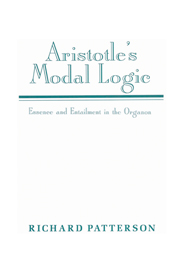Book contents
- Frontmatter
- Contents
- Acknowledgments
- Chapter 1 Introduction
- Chapter 2 The basic modal proposition
- Chapter 3 Syllogisms with two necessity premises
- Chapter 4 Mixed syllogisms: one assertoric and one necessity premise
- Chapter 5 Two-way possibility: some basic preliminaries
- Chapter 6 Two-way possibility syllogisms
- Chapter 7 Aristotle's perfect syllogisms
- Chapter 8 Principles of construction
- Appendix Categorical propositions and syllogisms
- Notes
- Select bibliography
- Index
Chapter 5 - Two-way possibility: some basic preliminaries
Published online by Cambridge University Press: 14 November 2009
- Frontmatter
- Contents
- Acknowledgments
- Chapter 1 Introduction
- Chapter 2 The basic modal proposition
- Chapter 3 Syllogisms with two necessity premises
- Chapter 4 Mixed syllogisms: one assertoric and one necessity premise
- Chapter 5 Two-way possibility: some basic preliminaries
- Chapter 6 Two-way possibility syllogisms
- Chapter 7 Aristotle's perfect syllogisms
- Chapter 8 Principles of construction
- Appendix Categorical propositions and syllogisms
- Notes
- Select bibliography
- Index
Summary
Although he briefly considers the notion of contingency (or two-way possibility) in chapter 3, Aristotle does not formulate his “official” definition of this modality until chapter 13: “I mean, by being contingent, and by that which is contingent, whatever is not necessary but, being assumed to obtain, entails no impossible consequences” (32a18–20). “Impossible” in the definiens must refer here to “one-way” possibility, defined as “not necessarily not,” with contingency (two-way possibility) defined in terms of necessity and/or one-way possibility.
We shall consider, however, Wieland's claim that two-way possibility is a modality sui generis. And from a larger perspective, one is confronted with difficult issues concerning the relation of contingency to “belonging by nature,” or “applying always or for the most part,” and, in turn, of the importance of Aristotle's logic of two-way possibility (developed in chapters 14–22 of Pr. An. A) for Aristotelian science. Aristotle touches on this last problem without resolving it in A.3 (25b14–31) and again in A.13 (32b4–22), where he asserts that there are scientific demonstrations concerning things associated “by nature or for the most part,” but not concerning chance associations.
Prominent among the more specific issues are, once again, those having to do with conversion. Here we encounter the usual questions about conversion of terms within A, E, I, and O propositions, only now in a way that requires resolution of a related issue about the “quality” (affirmative or negative) of two-way possibility propositions.
Information
- Type
- Chapter
- Information
- Aristotle's Modal LogicEssence and Entailment in the Organon, pp. 124 - 144Publisher: Cambridge University PressPrint publication year: 1995
